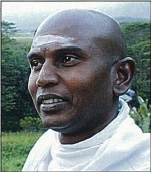BY BRAHMACHARI VEL MAHALINGUM
In the short 31 years since independence, Mauritius has made impressive progress economically, socially, intellectually and spiritually. From one industry before independence, sugar, we’ve developed several more, including textiles, tourism, offshore banking and a free port. On the social level, our fledgling democracy has already survived several crises and come out stronger each time. Each year there are more people acquiring high-level diplomas, so much so that Mauritius is now one of the best-educated countries in the world. On the spiritual level, Mauritius has always been a highly spiritual and devotional nation. Consider that 15 years ago 100,000 Hindus would pilgrimage on foot 40 miles up the mountain to Grand Bassin (a large lake, considered the Ganges of Mauritius) and back to their home at Maha Sivaratri time. Today that figure has grown to 600,000 pilgrims a year–virtually every Hindu in this nation of 1.3 million people, including doctors, engineers, lawmakers, renowned authors, artists, ministers, ambassadors–everyone.
Another tremendous spiritual uplift has been the influx of swamis and gurus into Mauritius. Not the kind who come by, give a lecture and are gone the next day, but swamis who have built ashrams and nurtured followings. For example, my guru, Sivaya Subramuniyaswami, has founded a monastery in Mauritius and established a Spiritual Park which is already a traditional place of worship for Ganesha. He’s introduced into Mauritius the Hindu teachings in modern language which has allowed people to understand their religion, appreciate the solidity of its tenets and beliefs and given them the ability to pass the religion on to the children. He has provided the professional elite of the nation with sound and rational explanations of Hindu thought and practice.
And there are other gurus who have impacted and are continuing to profoundly impact Mauritius since Independence. For example, Swami Venkateshananda, who established the Divine Life Society of Mauritius, Swami Chinmayananda, Amritananandamayi Ma and countless others. And in these ashrams, unlike those of the past, one finds people from all Hindu communities. Gone are the days of a “Tamil ashram,” “Telegu ashram,” etc.
I believe this progress is mainly the impact of the majority community of Hindus who are fervent about their religion. The precepts of ahimsa and of tolerance, which are integral to the Hindu way, have created a solid foundation for harmony throughout the country. The fact that we Hindus are so fervent has caused others to be fervent about their religion, resulting in a genuinely high level of spirituality throughout the nation that permeates everywhere, from the most humble folk right up through all the elite and top government echelon. The Hindu spirit of patience and forbearance has created a force of peace and a sentiment of joy, satisfaction and contentment. Even though the country is not rich and the rupee keeps falling, people are basically happy to make do with what they have.
There are exceptions, of course, fanatical elements here and there in villages. There was some disastrous violence in February of 1999 in which people died, but even this does not shake the solid foundation of essential harmony which is there. This understanding is not a petty conceit of Mauritians, their astounding social progress has been noted elsewhere. For example, the book, The Community of the Future classified Mauritius as one of the four model pluralistic communities of the world.
Our unique history contributes to our harmony. When the French colonized Mauritius in the 18th century, there were no people on the island. So when independence came, there were no “original Mauritians” to claim, “This is our land and you must now follow our religion, our culture, our language, etc.,” as happened in Madagascar and Mozambique. Instead, when the British left in 1968, we had an island with 30 distinct communities and subcommunities–Hindus, Christians, Chinese, Muslims, Jews, Sikhs and more. Each community wanted the best for itself. This may have seemed a disadvantage, but it actually provided something in common: each one who loved his community loved his culture, tradition, religion and language, which in turn meant he loved the principles of God, culture and community. We all understood devotion towards community as something precious and valuable. So that provided another basis for unity. On the surface it was divisive, but deep within there was a common understanding. Also, because everyone was so much enamored of their culture, they were less concerned for themselves, and therefore less selfish and more broadminded and generous. Every community gravitated around its religion and therefore around God. That is a great strength, bringing a higher sense of morality and kindness among the people. The deep sense of unity in Mauritian people is an indestructible unity that ultimately comes from God Himself.
At independence, a humble farmer composed a song about unity which impacted us all: “All people now, let’s take each other’s hand and let’s walk hand in hand. Hand in hand together, let us build the nation of Mauritius. Whether you’re a Hindu, whether you’re a Muslim, whether you’re a Christian or a Chinese, if you are born in Mauritius, the honor of the country is in your hands.”
Mauritius is indeed a unique place. The world can fully trust Mauritius and have confidence that these qualities will go on and on and only get stronger, never weaker. Om Namah Sivaya
Brahmachari Vel Mahalingum, 44, is a successful businessman in Mahébourg, Mauritius. Though obliged to drop out of school at a young age, he managed to educate himself and become an administrator in his family enterprise, a major bakery and a sari shop. He is a lifetime brahmachari presently residing at Kauai’s Hindu Monastery, home of Hinduism Today, where he is receiving training to religiously serve his countrymen. This column is translated from the original French..
